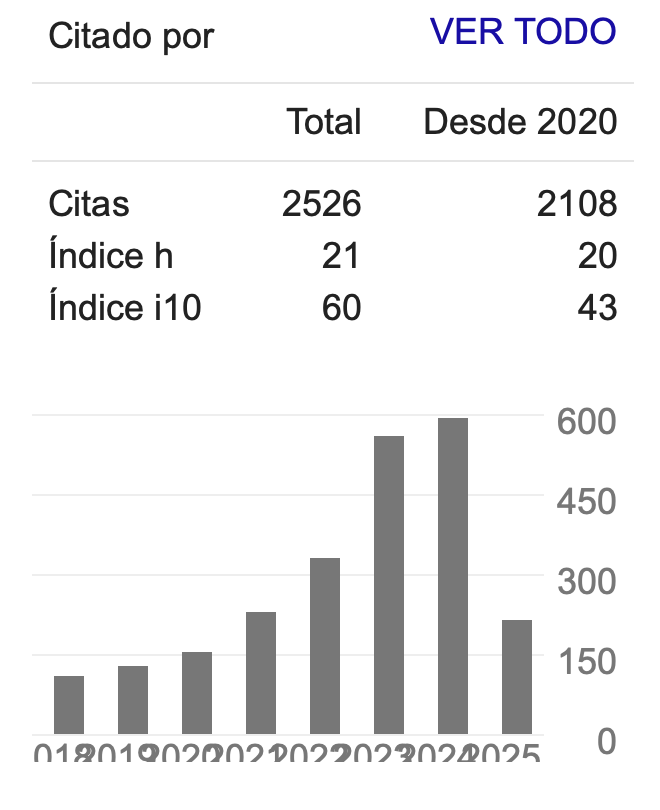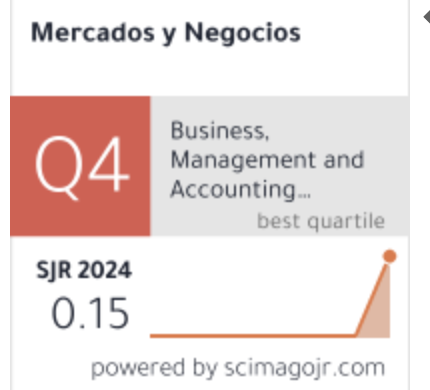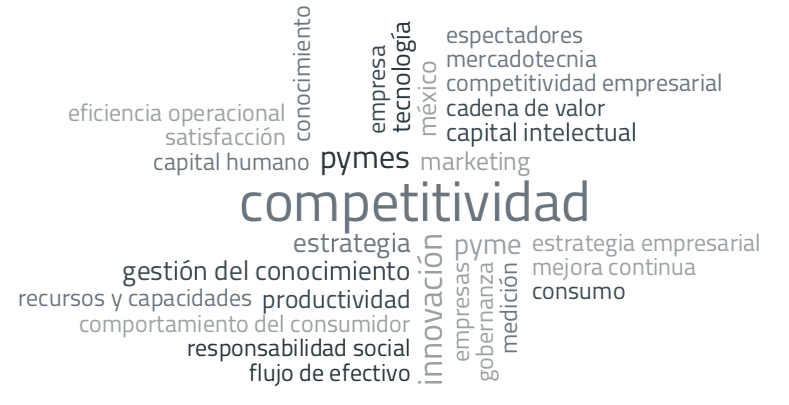Culture is a moderator of the interaction between financial inclusion and financial performance
DOI:
https://doi.org/10.32870/myn.vi56.7880Keywords:
Financial performance, Financial inclusion, Catur Purusa Artha culture, MSMEsAbstract
This study examines how the integration of local culture can enhance the connection between financial inclusion and the financial success of MSMEs in Bali. A survey was conducted on Hindu export-oriented MSME owners in Bali. Questionnaires, document analysis, and interviews were used to collect data, which were then analyzed using the SEM-PLS technique. The research findings show that, although financial services do not have a statistically significant effect, other results indicate a beneficial effect on financial performance. Additionally, local culture was found to strengthen this relationship. The study supports the Resource-Based Theory as a theoretical contribution, making it relevant in reducing barriers to the growth of MSMEs. The relevance of this article lies in providing new insights from the perspective of users, namely MSMEs, whose numbers are still relatively small, particularly in terms of utilising unique local genius values to enhance the interaction between financial inclusion and MSMEs’ financial performance.References
Abu, N., da Silva, F. P., & Vieira, P. R. (2025). Government support for SMEs in the Fintech Era: Enhancing access to finance, survival, and performance. Digital Business, 5(1), 100099. https://doi.org/10.1016/j.digbus.2024.100099.
Adugna, H. (2024). Fintech dividend: How would digital financial services impact income inequality across countries? Technology in Society, 77, 102485. https://doi.org/10.1016/j.techsoc.2024.102485.
Al-Eitan, G. N., Al-Own, B., & Bani-Khalid, T. (2022). Financial Inclusion Indicators Affect Profitability of Jordanian Commercial Banks: Panel Data Analysis. Economies, 10(2), 38. https://doi.org/10.3390/economies10020038.
Al-Matari, E. M., Al-Swidi, A. K., & Fadzil, F. H. B. (2014). The Measurements of Firm Performance’s Dimensions. Asian Journal of Finance & Accounting, 6(1), 24. https://doi.org/10.5296/ajfa.v6i1.4761.
Amin, S. R. D., & Pamungkas, H. P. (2022). Pengaruh Inklusi Keuangan dan Literasi keuangan Terhadap Kinerja UMKM Sub Sektor Usaha Mikro di Kabupaten Bojonegoro, Jawa Timur. Jurnal Apresiasi Ekonomi, 10(3), 377–385. https://doi.org/10.31846/jae.v10i3.480.
Banerjee, R., & Donato, R. (2021). The composition of financial inclusion in ASEAN and East Asia: A new hybrid index and some stylised facts. Financial Inclusion in Asia and Beyond: Measurement, Development Gaps, and Economic Consequences, 341, 29–53.
Barney, J. (1991). Firm Resources and Sustained Competitive Advantage. Journal of Management, 17(1), 99–120. https://doi.org/10.1177/014920639101700108.
Bhattacharyya, A., Rahman, M. L., & Wright, S. (2023). Improving small and medium‐size enterprise performance: Does working capital management enhance the effectiveness of financial inclusion? Accounting & Finance, 63(4), 3943–3969. https://doi.org/10.1111/acfi.13081.
Carè, R., Boitan, I. A., Stoian, A. M., & Fatima, R. (2025). Exploring the landscape of financial inclusion through the lens of financial technologies: A review. Finance Research Letters, 72, 106500. https://doi.org/10.1016/j.frl.2024.106500.
Chin, W. W., Marcolin, B. L., & Newsted, P. R. (2003). A Partial Least Squares Latent Variable Modeling Approach for Measuring Interaction Effects: Results from a Monte Carlo Simulation Study and an Electronic-Mail Emotion/Adoption Study. Information Systems Research, 14(2), 189–217. https://doi.org/10.1287/isre.14.2.189.16018.
Ciza, T. B., Kamdjoug, J. R. K., Biga-Diambeidou, M., Tchokote, I. D., & Kibekenge, G. B. (2025). Quality of accounting information and SMEs’ financial performance: The mediating role of bank and informal financing. Research in International Business and Finance, 75, 102763. https://doi.org/10.1016/j.ribaf.2025.102763.
Desmiyawati, D., Susilatri, S., Ramaiyanti, S., & Azlina, N. (2023). Improving The Performance of MSMEs Through Innovation, Financial Literacy, and Digitalization. JRAK, 15(2), 151–161. https://doi.org/10.23969/jrak.v15i2.7203.
Eton, M., Mwosi, F., Okello-Obura, C., Turyehebwa, A., & Uwonda, G. (2021). Financial inclusion and the growth of small medium enterprises in Uganda: empirical evidence from selected districts in Lango sub-region. Journal of Innovation and Entrepreneurship, 10(1), 23. https://doi.org/10.1186/s13731-021-00168-2.
Fatihudin, D., Jusni, & Mochklas, M. (2018). How measuring financial performance. International Journal of Civil Engineering and Technology, 9(6), 553–557.
Ghosh, S., & Vinod, D. (2017). What Constrains Financial Inclusion for Women? Evidence from Indian Micro data. World Development, 92, 60–81. https://doi.org/10.1016/j.worlddev.2016.11.011.
Ghozali, H. I. (2021). Partial Least Square, Konsep, Teknik Dan Aplikasi Menggunakan Program Smart PLS 3.2.9 Untuk Penelitian Empiris. 3rd ed. Universitas diponegoro.
Hair, J. F., Hult, G. T. M., Ringle, C. M., Sarstedt, M., Danks, N. P., & Ray, S. (2021). Partial Least Squares Structural Equation Modeling (PLS-SEM) Using R. Springer International Publishing. https://doi.org/10.1007/978-3-030-80519-7.
Kadjeng, I. N. (2010). Sārasamuccaya. Surabaya: Pāramita Surabaya.
Kalaipriya Kalaieesan. (2021). The Relationship Between Access to Finance and Growth of SMEs in the Northern Province of Sri Lanka: Financial Literacy as a Moderator. Management Studies, 9(3). https://doi.org/10.17265/2328-2185/2021.03.004.
Kozlenkova, I. V., Samaha, S. A., & Palmatier, R. W. (2014). Resource-based theory in marketing. Journal of the Academy of Marketing Science, 42(1), 1–21. https://doi.org/10.1007/s11747-013-0336-7.
Kumar, V., Thrikawala, S., & Acharya, S. (2022). Financial inclusion and bank profitability: Evidence from a developed market. Global Finance Journal, 53, 100609. https://doi.org/10.1016/j.gfj.2021.100609.
Lakuma, C. P., Marty, R., & Muhumuza, F. (2019). Financial inclusion and micro, small, and medium enterprises (MSMEs) growth in Uganda. Journal of Innovation and Entrepreneurship, 8(1), 15. https://doi.org/10.1186/s13731-019-0110-2.
Liu, Y., Luan, L., Wu, W., Zhang, Z., & Hsu, Y. (2021). Can digital financial inclusion promote China’s economic growth? International Review of Financial Analysis, 78, 101889. https://doi.org/10.1016/j.irfa.2021.101889.
Mago, S., & Chitokwindo, S. (2014). The Impact of Mobile Banking on Financial Inclusion In Zimbabwe: A Case for Masvingo Province. Mediterranean Journal of Social Sciences. https://doi.org/10.5901/mjss.2014.v5n9p221.
Makdissi, R., Nehme, A., & Chahine, R. (2020). The Influence of Financial Culture on SME’s Financial Performance. Journal of Financial Risk Management, 09(01), 1–22. https://doi.org/10.4236/jfrm.2020.91001.
Mamaro, L. P., & Sibindi, A. B. (2022). Entrepreneurial Financing in Africa during the COVID-19 Pandemic. Journal of Risk and Financial Management, 15(11), 511. https://doi.org/10.3390/jrfm15110511.
Marini, Yusmaniarti, Faradilla, I., & Setiorini, H. (2024). Measuring The Financial Performance Of Msmes From The Perspective Of Financial Literacy , Financial Inclusion And Financial Technology. Ekombis Review – Jurnal Ilmiah Ekonomi Dan Bisnis, 12(1), 285–296.
Moscalu, M., Girardone, C., & Calabrese, R. (2020). SMEs’ growth under financing constraints and banking markets integration in the euro area. Journal of Small Business Management, 58(4), 707–746. https://doi.org/10.1080/00472778.2019.1668722.
Owusu, J., Owusu Ansah, W., Djan, K. O., & Anin, E. K. (2021). Impact of financial resource building effort on financial resource availability among small and medium enterprises. Cogent Business & Management, 8(1). https://doi.org/10.1080/23311975.2021.1920676.
Pranatasari, D., Rahmanto, D. N. A., & Wicaksana, R. S. (2021). Digital Islamic Financial Literacy and Inclusion on Profitability of Micro, Small and Medium Enterprises. NUsantara Islamic Economic Journal, 1(1), 40–53. https://doi.org/10.34001/nuiej.v1i1.56.
Prasanna, R., Jayasundara, J., Naradda Gamage, S. K., Ekanayake, E., Rajapakshe, P., & Abeyrathne, G. (2019). Sustainability of SMEs in the Competition: A Systemic Review on Technological Challenges and SME Performance. Journal of Open Innovation: Technology, Market, and Complexity, 5(4), 100. https://doi.org/10.3390/joitmc5040100.
Presidential Regulation of the Republic of Indonesia Number 114 of 2020. (n.d.). 051209.
Satpathy, A. Sanatan, Sahoo, S. Kumar, Mohanty, A., & Mohanty, P. P. (2025). Strategies for enhancements of MSME resilience and sustainability in the post-COVID-19 era. Social Sciences & Humanities Open, 11, 101223. https://doi.org/10.1016/j.ssaho.2024.101223.
Suharman, H., Alipudin, A., & Hidayah, N. (2022). Corporate Social Responsibility, Intellectual Capital, and Corporate Performance in State-Owned Enterprises. Quality - Access to Success, 23(189). https://doi.org/10.47750/QAS/23.189.04.
Suminah, S., Suwarto, S., Sugihardjo, S., Anantanyu, S., & Padmaningrum, D. (2022). Determinants of micro, small, and medium-scale enterprise performers’ income during the Covid-19 pandemic era. Heliyon, 8(7), e09875. https://doi.org/10.1016/j.heliyon.2022.e09875.
Thathsarani, U. S., & Jianguo, W. (2022). Do Digital Finance and the Technology Acceptance Model Strengthen Financial Inclusion and SME Performance? Information, 13(8), 390. https://doi.org/10.3390/info13080390.
Ullah, B. (2020). Financial constraints, corruption, and SME growth in transition economies. The Quarterly Review of Economics and Finance, 75, 120–132. https://doi.org/10.1016/j.qref.2019.05.009.
Widiatami, A., Khasanah, N., Aeni, I., & Nurkhin, A. (2024). The Implication of Profitability As a Moderating in The Relation of Environmental Certification and Financial Performance to Market Reaction. JRAK, 16(1), 65–76. https://doi.org/10.23969/jrak.v16i1.7671.
Wijaya, L. I., Zunairoh, Z., Izharuddin, M., & Rianawati, A. (2025). Scope of E-Commerce use, innovation capability, and performance: Food sector MSMEs in Indonesia. Journal of Open Innovation: Technology, Market, and Complexity, 11(1), 100459. https://doi.org/10.1016/j.joitmc.2024.100459.
Yangdol, R., & Sarma, M. (2019). Demand-side Factors for Financial Inclusion: A Cross-country Empirical Analysis. International Studies, 56(2–3), 163–185. https://doi.org/10.1177/0020881719849246.
Yogantara, K., Yadnyana, I. K., Sudana, I. P., & Sujana, I. K. (2024). Bibliometric Investigation: Uncovering Financial Inclusion and Financial Performance of SMEs. JRAK, 16(2), 275–288. https://doi.org/10.23969/jrak.v16i2.14542.
Zubair, S., Kabir, R., & Huang, X. (2020). Does the financial crisis change the effect of financing on investment? Evidence from private SMEs. Journal of Business Research, 110, 456–463. https://doi.org/10.1016/j.jbusres.2020.01.063.
Published
How to Cite
Issue
Section
License
Copyright (c) 2025 Komang Krishna Yogantara, I Ketut Yadnyana, I Putu Sudana, I Ketut Sujana

This work is licensed under a Creative Commons Attribution-NonCommercial 4.0 International License.
Mercados y Negocios by Department of Mercadotecnia y Negocios Internacionales. University of Guadalajara is licensed under a License Creative Commons Attribution-NonCommercial 4.0 International.
The author retains the copyright.








